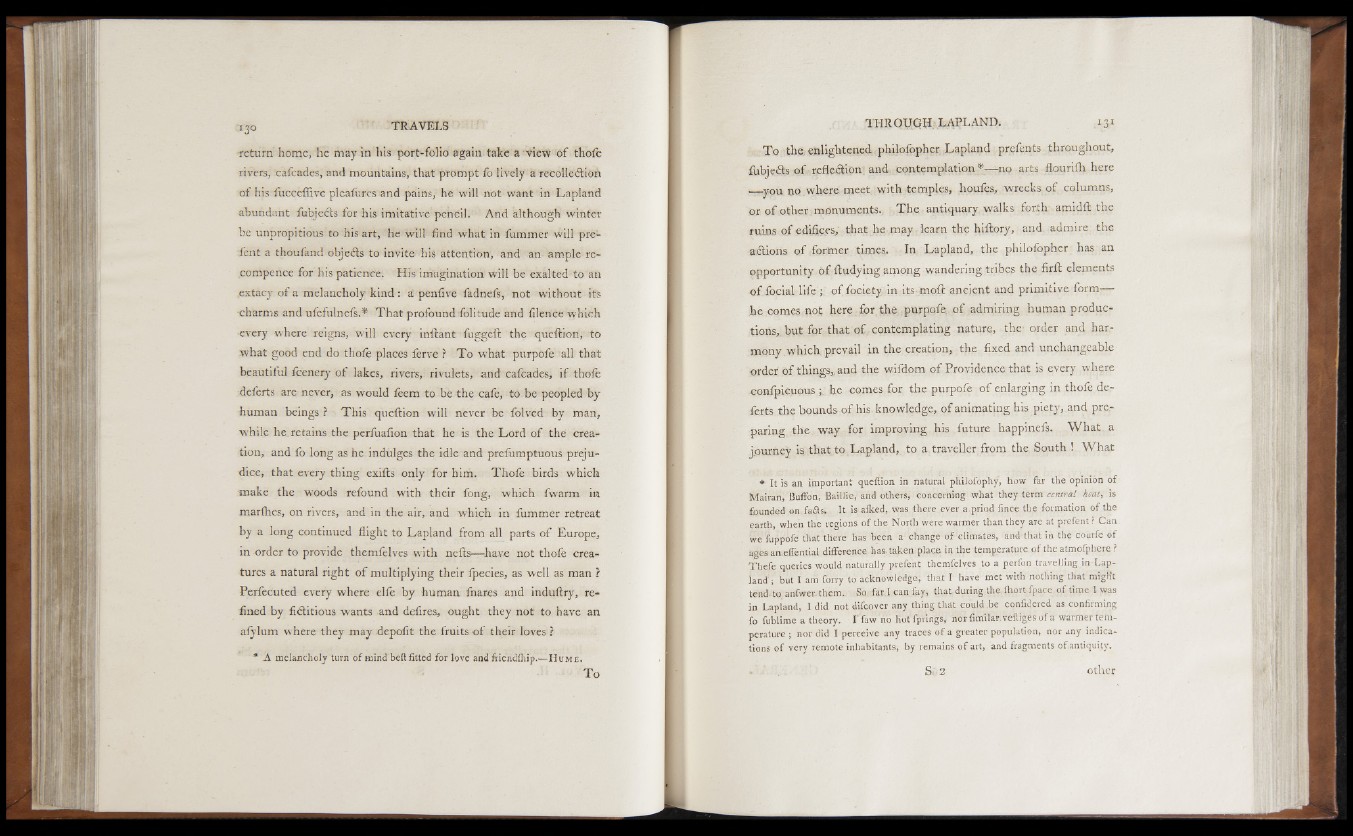
■return home, he may in his port-folio again take a view of thoie
rivers, cafcades, and mountains, that prompt fo lively a recollection
ot his fucceffive pleafures and pains, he will not want in Lapland
abundant fubjects for his imitative pencil. And although winter
be unpropitious to his art, he will find what in fummer will prefent
a thoufand objedts to invite his attention, and an ample re-
compence for his patience. His imagination will be exalted to an
extacy of a melancholy kind : a penfive fadnefs, not without its
charms and ufefulnefs.* T h a t profound lolitude and filence which
every where reigns, will every inftant fuggeft the queftion, to
what good end do thoie places ferve ? To what purpoie all; that
beautiful fcenery of lakes, rivers, rivulets, and cafcades, if thole
delerts are never, as would leem to be the cale, to be peopled by
human beings ? This queftion will never be folved by man,
while he. retains the perfuafion that he is the Lord of the creation,
and lo long as he indulges the idle and prefumptuous prejudice,
that every thing exifts only for him. Thofe birds which
make the woods refound with their fong, which fwarm in
marlhes, on rivers, and in the air, and which in fummer retreat
by a long continued flight to Lapland from all parts of Europe,
in order to provide themfelves with nefts—have not thole creatures
a natural right of multiplying their ipecies, as well as man ?
Perfecuted every where elfe by human fnares and induftry, refined
by fictitious wants and defires, ought they not to have an
afylum where they may depofit the fruits o f their loves ?
* A melancholy turn o f mind belt fitted for love and friendlhip.—H um e .
To
To the. enlightened philosopher Lapland prefents throughout,
fubjeCts o f reflection; and contemplation*—no arts flourifli here
you no.where meet.;with temples, houfes, wrecks, o f columns,
or of other monuments.. T h e antiquary, walks, forth’ amidft the
ruins of edifices, that he may learn the hiftory, and admire the
aCtions of former times. In Lapland, the philofopher has an
opportunity of ftudying among wandering tribes the firft elements
of focial life';.' o f ioeiety -in its moil ancient and primitive form-jjjr-
he comes not here for the purp'ofe. of admiring human productions,
but for th a t of contemplating nature, the order and harmony,
which prevail in the creation, the fixed and unchangeable
order of things,, and the wifdom of Providence that is every where
conlpicuous ; he comes for the purpofe of enlarging in thofe de-
ferts the bounds of his-knowledge, of animating his piety, and preparing,
the way for improving his future happinefs. W h a t a
journey is that, to Lapland, to a. traveller from the South ! W h a t
* It is an important queffion in natural pHiiofophy, how far the opinion of
Mairan, Buffon, Baillie, and others, concerning what they term central heat, is
founded on.fails. It. is afked, was there ever a.priod fince the formation of the
earth, when the regions of the North were warmer than they are at prefent ? Can
we fuppofe that there has been a change of climates, and that in the courfe of
ages ameffential difference has-taken place in the temperature of the atmofphere ?
Thefe queries would naturally prefent themfelves to a perfon travelling in Lapland’;
but I am forry to acknowledge; that I have met with nothing that might
tend'to anfwer. them.. So. far.I can fay, that, during the. ihort fpace of time I was
in Lapland, I did not difcover any thingthat could.be confidered as confirming
fo fublime a theory. I faw no hot fprings, nor fimilar.veiliges of a waimer temperature
; nor did I perceive any traces of a greater population, nor any indications
of very remote inhabitants, by remains of art, and fragments of,antiquity.
other